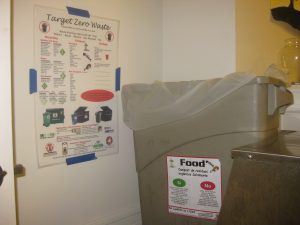Table of Contents
In the spring of 2009, the ASSU Undergraduate Senate’s Sustainability Subcommittee established the Green Events Checklist in an attempt to “encourage” student organizations hosting events funded by the ASSU to take into consideration a variety of sustainable standards. However, efforts have recently surfaced within the Senate to make these standards mandatory campus-wide, causing students to question how and why they should be held accountable for “green” practices.
The Green Events Checklist stipulates, among other things, that organizations must purchase compostables such as cups, utensils, and plates from the ASSU Green Store, while cutting the use of tablecloths and decorations at events involving meals unless there is “a demonstrated need for them.” The list also draws on environmentally friendly catering standards already set by Stanford’s Student Housing Guidelines, including that organizations should buy food locally, not over-purchase, and offer vegetarian options at events.
With regard to advertisement, the Checklist requires that digital media be used to promote events, ensuring that all necessary materials are recyclable. In addition, it encourages a heightened awareness of how and where to dispose of waste.
The idea of making the Checklist legally binding on student groups first surfaced in early November, in a proposition by Senator Adam Creasman ’11. Creasman explained that the Senate would perform a “financial analysis” determining the success or failure of the Checklist in the spring of 2010. In addition, the Senate would gather anecdotal evidence by communicating with student group leaders and financial officers. Depending on the outcome of this analysis, the Senate might then “strongly consider implementing [the Checklist] campus-wide.”
Theo Gibbs ’11, co-president of Students for a Sustainable Stanford and member of the ASSU Subcommittee for Sustainability, says that mandating the Checklist campus-wide has always been “the ultimate long-term idea” of her organization. Gibbs stressed that “Stanford should be a leader in everyday practices,” and implementing the Checklist is, in her view, an easy way to fulfill this role.
Creasman’s take on the bill is that it is “widely popular amongst the Senate and student body.” Gibbs concurred, stating that ASSU president David Gobaud has been “really involved with sustainability issues and the Green Events Checklist” and that “there is a lot of administrative support for the bill.”
Creasman predicted that the Checklist will be “relatively easy to implement and not a great financial burden.” However, he acknowledged the current financial crunch and pointed out that an important question to ask is whether or not it is “fair or reasonable to put an additional burden on student groups.” Creasman recognized that “there definitely has to be a balance” between the additional costs associated with mandating the Checklist and the importance of “helping Stanford University to reduce its carbon footprint.”
Dean Young ’11, who created the Undergraduate Senate’s Sustainability Subcommittee last spring and now serves as its Chair, agrees that the Senate strongly supports making the Checklist mandatory for student groups, particularly in light of “quite a bit of pressure [coming] from the Sustainability Committee.”
“I’m not sure how I feel about this,” said Creasman. “It will come down to the analysis. If the marginal increase in cost is low,” then the Checklist will likely be mandated among student groups. Yet Creasman admitted he was not sure “what that threshold is.” If the cost to student organizations is “vastly expensive and impedes people from throwing events, then we will have to reconsider [making the Checklist mandatory].”
Young, however, firmly stated, “I would definitely lobby for the Twelfth Undergraduate Senate to incorporate [the Checklist] into their funding policies.” Because funding policies were set last spring, he noted that initial encouragement to follow the checklist was meant to “give [student groups] warning by trying to set a precedent during this trial period.”
Yet the question remains as to how to hold people accountable to the list’s requirements. Creasman stated that there has been “no discussion” of the accountability factor. Young admitted that no “watchdog agency” exists to ensure that student groups adhere to the Checklist. He stressed the critical role that the social media would play in keeping student groups on track with green standards, particularly newspapers, blogs, and the Students for a Sustainable Stanford organization. By publicizing breaches of the list’s stipulations, Young believes it would be possible to hold student groups accountable to a certain extent.
Gibbs also admits: “We have not finalized complete enforcement.” She expressed interest in creating a “green events consulting group” comprised of members of both Students for a Sustainable Stanford and the ASSU, which she believes would “create a sense of ownership of green standards” among student organizations.
Young made sure to reiterate, however, that “this is a transitional period.” Radical changes are unlikely, and it should be “very easy [for student groups] to transition” between fall and spring quarters.
Stanford’s Green Events Checklist may address “a very small part of a global issue,” but Young believes that “little changes in behavior now work up to big changes later.”




